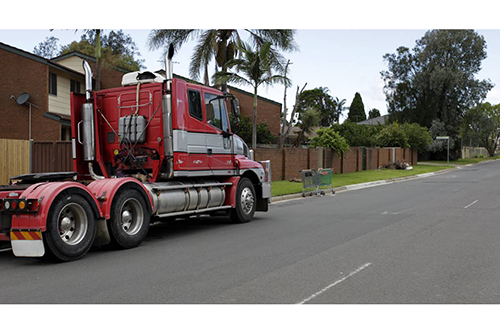Community Policing Officer
The presence of heavy trucks parked in residential areas of Windhoek is a growing concern that demands the attention of both the Windhoek City Police, residents and visitors. While the convenience of proximity might be tempting for drivers and operators, it is crucial to recognize the dangers and negative implications associated with such parking practices. Let’s delve into some of the significant hazards posed by parking heavy trucks in residential neighborhoods.
Firstly, large trucks are prone to causing traffic congestion and safety hazards. This is due to the fact that heavy trucks are considerably larger than standard passenger vehicles and can occupy a significant portion of the road when parked. This can narrow the available road space, impeding the smooth flow of traffic and potentially leading to congestion. Narrower lanes may also increase the likelihood of accidents, especially in areas with limited visibility or busy intersections.
Additionally, heavy trucks can obstruct the line of sight for residents, particularly when trying to exit driveways or when crossing the road. This diminished visibility poses a serious safety risk for pedestrians, cyclists, and other motorists, potentially leading to accidents and injuries. Trucks are also normally reported to produce serious noise and air pollution. This is because, trucks often run powerful engines, producing higher levels of noise and emitting more pollutants, such as particulate matter and exhaust gases. Parking these vehicles in residential areas can lead to increased noise pollution and reduced air quality, adversely impacting the health and well-being of residents.
Moreover, it is key to note if not parked properly, heavy trucks’ size and weight can cause severe property damage. This applies to low-hanging branches, fences, and even residential structures that can be damaged when trucks maneuver in tight residential spaces.
The Road Transport Regulation of 2001 under sub-regulation 338 addresses parking offenses and specifically points to parking of heavy vehicles. This regulation prohibits the parking of heavy vehicles in any street in a municipal area between 19h00 and 07h00. In the same vein, the regulation also stipulates that by wilfully or negligently causing any obstruction/interference/nuisance or hinderance to pedestriantTraffic in street/public place with a vehicle, animal or other object such person could be liable to a fine of N$1 000.
It is therefore imperative to remember that in the event of emergencies, such as fires or medical crises, access to residential areas can be impeded by improperly parked heavy trucks. Seconds count during emergencies and any delay in emergency services reaching the affected area can have dire consequences.
To mitigate these dangers, it is essential for truck drivers and operators to comply with parking regulations and utilise designated parking areas specifically designed to accommodate heavy vehicles. By respecting residential spaces and adhering to local traffic laws, we can collectively ensure the safety and well-being of all members of our community.
The Windhoek Municipal Police Service (WMPS) can be contacted toll-free at: 061-302 302.


